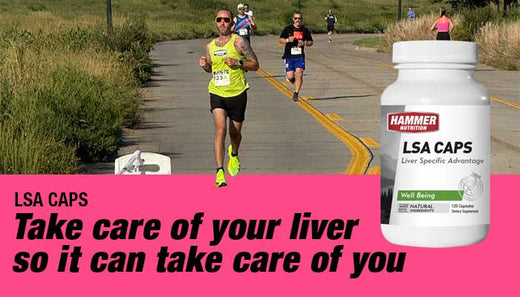
BY ENDURANCE NEWS STAFF
Over 50 years ago, the Sugar Research Foundation (SRF) funded Project 259, a study that examined and compared the effects of gut bacteria and cardiovascular health after rats consumed either a starch-containing diet or sucrose (table sugar). The study's early results showed that sucrose negatively altered the microbiota of the sugar-fed rats to the point where it increased their levels of triglycerides. When elevated, triglycerides are a primary culprit for clogged arteries which can lead to cardiovascular disease. The elevated triglyceride levels were not seen in the rats consuming the starch-food diet. Another negative result of the early stages of the study showed that, compared to a starch diet, the high-sugar diet boosted the activity of an enzyme, beta-glucuronidase, which is linked to bladder cancer. These results were much different than the SRF expected.
When researchers from the University of California at San Francisco discovered a plethora of documents from Project 259—all of which reflected negatively on the sugar industry's interests—they found that Project 259 was cut short, the funding ceased, and the results were never published. By shutting down the project without disclosing evidence of Sugar's harm, the SRF (which eventually changed its name to the International Sugar Research Foundation, or ISRF) had essentially covered up Sugar's role in cardiovascular disease. [1]
In a paper published in PLOS Biology, lead authors Drs. Cristin E. Kearns and Stanton A. Glantz of UCSF stated:
Project 259 demonstrated that sucrose, by stimulating urinary beta-glucuronidase, may have a role in the pathogenesis of bladder cancer. Beta-glucuronidase is an enzyme, and high levels in the urine were known to be associated with bladder cancer in the 1960s.
Evidence emerged in the 1950s and 1960s that linked sugar consumption to heart disease, but the sugar industry was interested in casting doubt on that evidence. In Project 259, they were proving that to themselves.
It gets even worse; Doctors Kearns and Glantz uncovered that the SRF had "sponsored" (i.e., paid for) research by Harvard scientists to refute concerns about Sugar's possible role in heart disease to make Sugar seem less unhealthy. Instead, they claimed that fat in our diets was the real villain. John Hickson, a top sugar industry executive, discussed a plan with others in the industry to shift public opinion by releasing the "research," published in the New England Journal of Medicine in 1967, and influencing legislation.
Amazingly, one of the Harvard researchers, the now-deceased Dr. Frederick J. Stare, bolstered the idea that Sugar was a harmless substance by including recommendations [2] such as:
- Sugar is "a quick energy food...put a teaspoon in [your] coffee or tea three or four times a day."
- Coca-Cola is "a healthy between-meals snack."
- "All Americans should drink a cup of corn oil a day."
- "Eat your [food] additives. They are good for you."
- "We get as much food value from refined foods that have been enriched as from natural foods, and sometimes more."
Regarding the published NEJM research, Dr. Glantz stated:
It was a brilliant thing the sugar industry did; review papers, especially if published in a prominent journal, tend to shape the overall scientific discussion.
He then bluntly added:
This manipulation of research is similar to what the tobacco industry did. It calls into question sugar industry-funded studies as a reliable source of information for public policy making. This case illustrates that, like the tobacco industry, the sugar industry has a long history of suppressing scientific results that do not support its economic interests.
We know today that the plug got pulled, and nothing got published. We are still determining what would have happened had this study come out differently and showed no effect of Sugar. Our bet, it would have been published, and they would be thumping the drums about it.
Our study contributes to a broader body of literature documenting industry manipulation of science. Based on ISRF's interpretation of preliminary results, extending Project 259's funding would have been unfavorable to the sugar industry's commercial interests. The significance of the study's emergence, more than 50 years later, is the level of skepticism that must be adhered to when examining industry-funded studies as the scientific community continues to debunk corporate-manufactured ideas of what constitutes healthy eating habits.
Combined with the relentless promotion that Sugar was not the cause of health issues, one must wonder how many people unnecessarily succumbed to sugar-related disease and death.
Of course, we cannot blame Dr. Stare for all the deaths from excess sugar consumption. However, the statistics are staggering and disturbing: Even as far back as 2006, deaths from coronary heart disease, diabetes, and stroke caused explicitly by elevated blood glucose were estimated to be approximately 3.2 million annually. [3, 4, 5] Nearly 17 years later, those figures have undoubtedly grown by a significant amount.
While decades of research have shown Sugar's detrimental effects on health, once again, it appears that "Big Sugar" has been manipulating the science—even burying the results of their project. If Sugar is innocent, why would the sugar industry suppress evidence or pay off scientists to produce a research paper whose sole purpose was to shift the blame away from Sugar?
Project 259 indeed revealed the sugar industry's hypocrisy, with Dr. Kearns suggesting that had the preliminary results been confirmed and published, a more in-depth examination of Sugar being a carcinogenic food would have resulted. Interestingly, research conducted in the latter part of 1960 studied artificial sweeteners to determine if similar cancer-causing effects would occur. When the artificial sweetener, cyclamate, was found to increase bladder cancer risk in rats, it was banned soon afterward. Sugar, it would seem obvious, got a big-time pass, even though its results on bladder cancer risk were similar to those found for an artificial sweetener.
Sadly, the deceptive practices and influences of the sugar industry still appear to be happening. For example, in 2015, a paper was published in PLoS Medicine [6] that revealed how the sugar industry influenced the National Institute of Dental Research (NIDR). In 1971, the NIDR launched a program called the National Caries Program (NCP), designed to identify interventions to eradicate tooth decay within a decade. As it turned out, research that could have been harmful to sugar industry interests was omitted from priorities identified at the program's launch. Instead of exploring the benefits of less sugar consumption, the focus shifted to other more-costly and less-plausible possibilities, including finding a vaccine for tooth decay.
In their conclusions, the authors wrote:
The NCP was a missed opportunity to develop a scientific understanding of restricting sugar consumption to prevent tooth decay. A key factor was the alignment of research agendas between the NIDR and the sugar industry. This historical example illustrates how the industry protects itself from potentially damaging research, which can inform policymakers today.
SUMMARY
The accumulation of over a half-decade of research has clearly shown that Sugar is a significant risk factor for coronary heart disease. Unfortunately, that information has been suppressed by the sugar industry and, sadly, continues to this day. Going back to the Project 259 incident in the mid-'60s, nutritional expert Marion Nestle wrote:
This 50-year-old incident may seem like ancient history, but it is quite relevant because it answers some questions germane to our current era. Is it true that food companies deliberately set out to manipulate research in their favor? Yes, it is, and the practice continues. [7]
Dr. Kearns added that if the preliminary results had been confirmed and published, it would have caused more scrutiny of Sugar as a carcinogenic food additive. In the late 1960s, artificial sweeteners were being examined over similar concerns. For example, a 1969 study found that cyclamate, an artificial sweetener, increased the risk of bladder cancer in rats, and this sweetener was banned shortly afterward.
The sugar industry's intentional withholding of evidence regarding sucrose's adverse health effects was widely reported in many mainstream outlets many years ago, and it would seem— "one and done." We also wrote about it back in Endurance News #108 when the news first came to light, and we write about it again now because it is such an important story, one that deserves more than a one-time discussion/article.
We also revisit "Sugargate" because we want to strongly remind you that Sugar is not a harmless, benign substance; it is simply not good for your health or athletic performance and never will be. Dr. Bayne French states:
Sugar IS special in a sinister, toxic kind of way. I have observed similar findings in my adult patients. Athletes who fuel with simple carb/sugar show similar laboratory results to obese, poorly controlled diabetic patients: Elevated blood sugar and insulin levels, high triglycerides, low HDL (good cholesterol), small and dense LDL (bad cholesterol) particles, and high CRP (inflammatory marker).
Big Sugar will tell you otherwise, but do not be swayed by their deceptive claims. Excess sugar intake is a major factor in heart disease, the number one killer of Americans. A 2019 American Heart Association report states that 121.5 million adults in the U.S. (48%) have cardiovascular disease. [8]
There is no wonder why Sugar is referred to as "The White Devil." Do not be a victim! Do not be a statistic! Avoid Sugar as much as you possibly can!
REFERENCES:
[1] https://journals.plos.org/plosbiology/article?id=10.1371/journal.pbio.2003460
[2] https://www.seleneriverpress.com/historical/open-letters-concerning-dr-frederick-j-stare-modern-nutrition-magazine
[3] http://www.abc.net.au/health/thepulse/stories/2006/11/30/1800833.htm
[4] http://www.cbc.ca/news/technology/high-blood-sugar-adds-to-heart-disease-death-toll-1.58906
[5] Danaei G, Lawes CM, Vander Hoorn S, et al. Global and regional mortality from ischaemic heart disease and stroke attributable to higher-than-optimum blood glucose concentration: comparative risk assessment. Lancet. 2006;368(9548):1651-9.
[6] Kearns CE, Glantz SA, Schmidt LA. Sugar industry influence on the scientific agenda of the National Institute of Dental Research’s 1971 National Caries Program: a historical analysis of internal documents. PLoS Med. 2015;12(3):e1001798.
[7] Nestle M. Food Industry Funding of Nutrition Research: The Relevance of History for Current Debates. JAMA Intern Med. 2016;176(11):1685-6.
[8] https://www.heart.org/en/news/2019/01/31/cardiovascular-diseases-affect-nearly-half-of-american-adults-statistics-show










12 comments
Excellent, but this points to a much bigger picture. Like the tobacco apologists, researchers who were funded by those seeking affirmation through positive “scientific” studies, Science has and is being corrupted by cash. This starts at the top with billions of government dollars promoting (or disparaging) various political agendas in the name of science. Even the free exchange of opposing views is being prevented. The consequences of such suppression have led to a general distrust of scientific research in general and our government health authorities in particular.
Wonderful article! (although I wish I wasn’t making cookies for the holidays today…) What are your thoughts about plant based sugars such as stevia and monk fruit?
———
Hammer Nutrition replied:
Hi Sarah, Thank you for your comment and question – Everything in moderation, including occasional moderation – I always say if you are going to eat sugar, make it count, like special holiday cookies! We do use both stevia and monk fruit to provide the sweetness that people are so programmed to want/expect in these type of products. My concern is that they perpetuate the cravings for “sweet” tastes. Moderation also applies here – whether it’s a natural sweetener or any other “substitute” for dairy or meat, I use them only when consuming my products and in my daily diet, I prefer to eat much less of the real thing. BDF
Great Article. I appreciate the transparency and someone stepping up to inform us of health risks. Thanks for the reminders.
I use your products!
I have heard and read about the sugar people for many years.
Let’s not forget they blamed it all on salt.
Not true.
Glad Steve and Frank are listening to the truth. I have discussed my sugar issues with Steve.
L. Lefkowitz
Over the last 10 years these articles have probably helped me as much as the use of Hammer products. I very much appreciate them.
Thank you.
———
Hammer Nutrition replied:
Hi Sandra, thank you for your comment and affirmation. It is my pleasure to share this information with those who wish to receive it. BDF